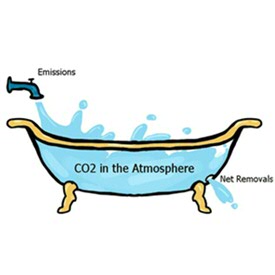Climate change, the coronavirus, and the economy | Klaus Hubacek

Climate change caused by carbon emissions is the leading global environmental problem today. Mitigating carbon emissions and adapting to climate change requires the integration of different types of approaches to support the transformation of society towards sustainability.
Text: Henrietta Doe, Communication Office, University of Groningen
The corona pandemic shows that the current economy is not shock proof (i.e. adaptive to catastrophic events), nor is it sustainable with large amounts of emissions and resource consumption. However, a crisis is a very good opportunity to make change happen. With governments enforcing lockdowns in response to the pandemic, indicators show that industrial activity, transport use, and electricity demand are being dramatically reduced. ‘Yet, this likely reduction in CO2 still would make little to no difference in achieving climate targets, as we will need to have similar reductions year after year,’ says Klaus Hubacek, an ecological economist and professor at the University of Groningen’s Faculty of Science and Engineering.
Global emissions would still need to drop by more than 6 percent every year this decade – more than 2,200 million metric tons of CO2 annually – in order to maintain warming to 1.5°C above pre-industrial levels (IPCC, 2018). It is difficult to see how this can be achieved without large scale structural changes and without losing sight of the huge inequality that exists within countries and globally.

Another aspect of the current crisis is how quickly some aspects of the environment recovered due to the reduction in economic activity. Corona-related economic stimulus plans need to be linked to climate and other environmental targets in the EU and the US as a means of transforming the economy. Hubacek is currently researching the economic damage of the coronacrisis, and its impact on global carbon emissions. As a member of the Intergovernmental Panel on Climate Change (IPCC), his work feeds directly into the climate negotiations. He is also working on emission accounting for global cities, assessing the social impacts of climate politics and carbon taxes, especially related to the high costs for poor households (to avoid backlashes like the French Yellow Jersey protests) and the job implications of the coming energy transition.
At the university level, such a transition to sustainability can include carbon footprint reducing policies and institutional changes relating to procurement and prioritizing research and teaching agendas. The University of Groningen strives to be a CO2-neutral university, and its Green Office is currently working on new ambitions for the Roadmap 2020-2025.
Meer informatie
- Klaus Hubacek
- IPCC, 2018: Global warming of 1.5°C. An IPCC Special Report on the impacts of global warming of 1.5°C above pre-industrial levels and related global greenhouse gas emission pathways, in the context of strengthening the global response to the threat of climate change, sustainable development, and efforts to eradicate poverty [Masson-Delmotte, V., P. Zhai, H.-O. Pörtner, D. Roberts, J. Skea, P.R. Shukla, A. Pirani, W. Moufouma-Okia, C. Péan, R. Pidcock, S. Connors, J.B.R. Matthews, Y. Chen, X. Zhou, M.I. Gomis, E. Lonnoy, T. Maycock, M. Tignor, and T. Waterfield (eds.)]. In press.
| Last modified: | 02 July 2020 4.46 p.m. |
More news
-
24 March 2025
UG 28th in World's Most International Universities 2025 rankings
The University of Groningen has been ranked 28th in the World's Most International Universities 2025 by Times Higher Education. With this, the UG leaves behind institutions such as MIT and Harvard. The 28th place marks an increase of five places: in...
-
05 March 2025
Women in Science
The UG celebrates International Women’s Day with a special photo series: Women in Science.
-
16 December 2024
Jouke de Vries: ‘The University will have to be flexible’
2024 was a festive year for the University of Groningen. In this podcast, Jouke de Vries, the chair of the Executive Board, looks back.
